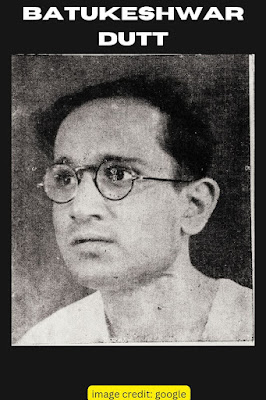Batukeshwar Dutt (1910–1965)
Batukeshwar Dutt is remembered as one of the prominent figures in India’s struggle for independence against British colonial rule. His fervent dedication to the cause of freedom and his courageous acts during the Indian independence movement have earned him a lasting place in history.
Born on November 18, 1910, in Oari village in the Purba Bardhaman district of Bengal (now in West Bengal, India), Batukeshwar Dutt hailed from a middle-class family. His father, Gostha Behari Dutt, was a revenue officer.
Batukeshwar Dutt received his early education in his village school. He later moved to Calcutta (now Kolkata) for further studies and became associated with revolutionary groups during his time in the city.
Dutt’s exposure to the political atmosphere in Calcutta ignited his passion for revolutionary activities. He became influenced by the ideas of various revolutionary leaders and groups advocating for India’s independence from British rule.
Dutt actively participated in various activities organized by revolutionary groups, including protests, demonstrations, and acts of civil disobedience aimed at challenging British authority and advancing the cause of Indian independence.
Batukeshwar Dutt was deeply influenced by the ideologies of prominent leaders such as Bhagat Singh and Chandrashekhar Azad. Their radical approach towards achieving independence through armed struggle left a significant impact on Dutt’s own revolutionary convictions and actions.
Role in the Kakori Conspiracy
Batukeshwar Dutt played a significant role in the Kakori Train Robbery, which took place on August 9, 1925. Along with other revolutionaries, including Ram Prasad Bismil, Ashfaqullah Khan, and Chandrashekhar Azad, Dutt was involved in the daring act of looting a train carrying government funds near Kakori, in present-day Uttar Pradesh, India. The aim was to fund revolutionary activities and raise awareness about the struggle for independence.
Following the Kakori Train Robbery, Batukeshwar Dutt was arrested by British authorities along with other conspirators. He faced a highly publicized trial where he openly declared his allegiance to the cause of Indian independence and refused to seek leniency from the British colonial administration.
Batukeshwar Dutt, along with other participants of the Kakori Conspiracy, was sentenced to life imprisonment by the British court. Despite being handed a harsh punishment, Dutt remained resolute and continued to advocate for the cause of freedom from behind bars.
Contribution to the Non-Cooperation Movement
Batukeshwar Dutt collaborated closely with Bhagat Singh, another prominent revolutionary figure, during the Non-Cooperation Movement. Their partnership strengthened the revolutionary activities undertaken to challenge British rule and inspire the masses to join the struggle for independence.
Dutt was involved in the Central Legislative Assembly bombing in Delhi on April 8, 1929. Alongside Bhagat Singh, he carried out this act as a protest against the passage of repressive laws and to demand better treatment for political prisoners.
Batukeshwar Dutt’s ideological standpoint was rooted in the belief in armed struggle as a means to achieve independence from British colonial rule. He was motivated by a fervent desire to free India from foreign domination and to establish a democratic and just society based on principles of equality and freedom.
Incarceration and Political Impact
During his imprisonment, Batukeshwar Dutt endured severe hardships and faced brutal treatment at the hands of the British authorities. Despite the challenging conditions, he remained steadfast in his commitment to the cause of Indian independence and continued to inspire his fellow inmates with his resilience and determination.
Batukeshwar Dutt’s unwavering dedication to the struggle for independence had a profound impact on his fellow inmates. His leadership qualities, coupled with his ideological clarity and resilience, inspired many others to remain committed to the cause despite the adversities they faced in prison.
Even while incarcerated, Batukeshwar Dutt continued to advocate for India’s independence through various means available to him. He engaged in discussions, wrote letters, and participated in acts of resistance within the confines of the prison, contributing to the ongoing momentum of the independence movement.
Later Life and Legacy
Batukeshwar Dutt was eventually released from prison following India‘s independence in 1947. His release marked the end of a long and arduous journey spent fighting for the country’s freedom.
After his release, Dutt remained active in social and political circles, continuing to advocate for the welfare of the people and the ideals of the independence movement. He engaged in various activities aimed at nation-building and promoting social justice.
Batukeshwar Dutt received recognition for his contributions to the independence struggle. He was honored by the government and various organizations for his sacrifices and dedication to the cause of freedom.
Batukeshwar Dutt passed away on July 20, 1965, but his legacy continues to inspire generations of Indians. He is remembered as a fearless revolutionary who dedicated his life to the fight against colonial oppression and as a symbol of courage and resilience in the quest for independence.
Thank you for your time and consideration 🙏❤️…..
@Puja Singh…..




